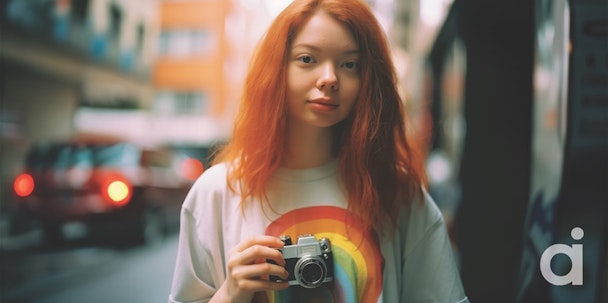Why Ogilvy is leading a crackdown on AI-generated influencer ads
The agency will label influencer content on social media with the hashtag #PoweredbyAI or by using a dedicated watermark.

Example image of an AI watermark within an influencer ad / Ogilvy
Ogilvy has urged platforms and policymakers to enforce brands to label all AI-generated influencer content in a bid to protect the media channel’s effectiveness.
The agency’s global head of influence Rahul Titus tells The Drum: “AI has the potential to shake the very core of what makes influencer marketing effective.” The mastermind behind Ogilvy’s influencer editing ban, Titus says that consumers trust people more than they trust brands and that is why influencer marketing works as a channel.
“Influencer marketing works today because there’s authenticity and trust. If we lose that trust and authenticity the whole channel becomes questionable. If we aren’t honest with our end consumers then we lose the effectiveness of influencer marketing as a channel.”
Advertisement
His answer is the AI Accountability Act, which would require brands to disclose any influencer content that has been generated by AI – either with the hashtag #PoweredbyAI or, when there isn’t the option for text, with a watermark.
From Monday, Ogilvy will mandate that its clients disclose all AI-generated influencer campaigns going forward. “We have to put our money where our mouth is,” says Titus.

Titus was emboldened to act when the AI-generated picture of the Pope wearing a Balenciaga coat circulated the internet for days before people realized it was fake. “It was so close to reality you could almost believe that could have happened. But that is just one example, we are going to see so much more of that going forward.”
The agency itself is already far along its journey of using AI, for example when it licensed the Indian actor Shah Rukh Khan for a Cadbury’s campaign that enabled local shops to adapt his image for their own marketing. “If Ogilvy is doing that much AI-generated influencer marketing work, it’s only a matter of time before the rest industry does more in that space, and it probably already is.”
Advertisement
He acknowledges that, at present, AI-generated content accounts for only a fraction of influencer output, but says: “Given how fast everything grows in influencer marketing, it’s not going to be very long before AI has some role to play in influencer campaigns.” He adds that AI is already a big part of the influencer marketing infrastructure, like identification, payment and management.
In the six months since generative AI became the dominant industry discussion a lot of debate has been around whether there should be regulation or an ethics framework around the use of AI in marketing campaigns. Titus says he’s calling for policy change because it's more achievable. “I can sit and debate ethics around it but it’s so early in that conversation around ethics versus policy change, we think it will have a bigger impact.
“The reality of the world we live in today is AI is coming on fast you can’t fight AI you have to work with AI. I would rather create the right framework for us to work with AI and make AI an enabler and not the enemy. It will make us better at what we do and do it faster and more efficiently so why would we not embrace it but we need to give it a clear foundation and a framework of how we play with AI.”
Suggested newsletters for you
He isn’t expecting this solution to be permanent as he explains it could evolve over time with better ideas but there was the need to start somewhere instead of wasting time deliberating on the correct disclosure method.
The policy is part of Titus’s inclusive influencer initiative which kicked off last year when Ogilvy UK took the bold decision to cut ties with influencers who edited their faces or bodies. In the 12 months since Titus revealed the ban to The Drum, Ogilvy has implemented the policy in more markets and extended it to its agency network. He says industry reaction over the past year has given him “even more confidence” that the agency did the right thing. “Even though it might be painful, it is absolutely the right thing to do because it does have an effect. It takes a while, but it does have an effect.”
While Titus’s action around beauty filters was rooted in fears over the damage social media was causing to young people’s mental health, this AI policy is about protecting the media channel. But he acknowledges that the industry is so early into AI-generated influencer campaigns that no one can know the potential effect.
When Ogilvy introduced its editing ban, the negative impact of beauty filters on mental health had already taken hold. “With AI, this is the start of the journey and not at the end of the journey. If we do this now, we have the chance of getting it right and nipping it in the bud.”

